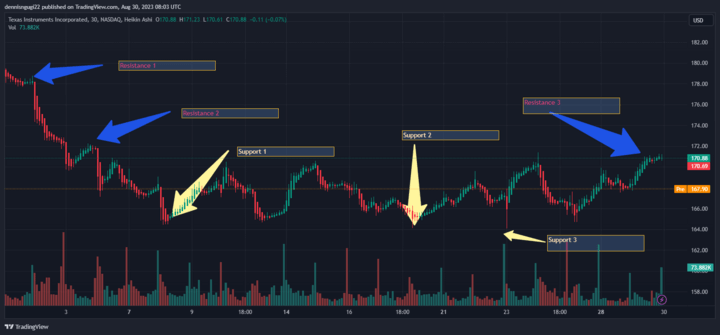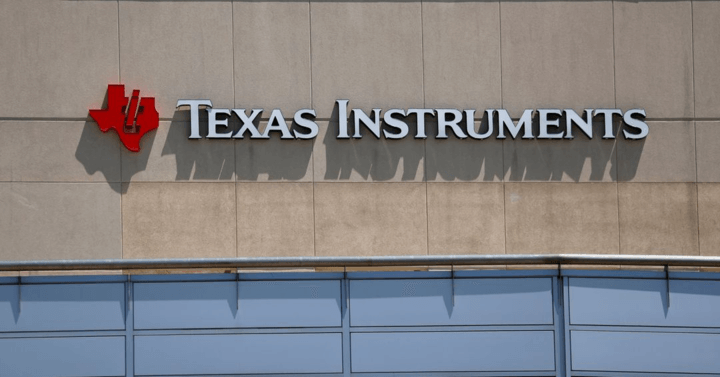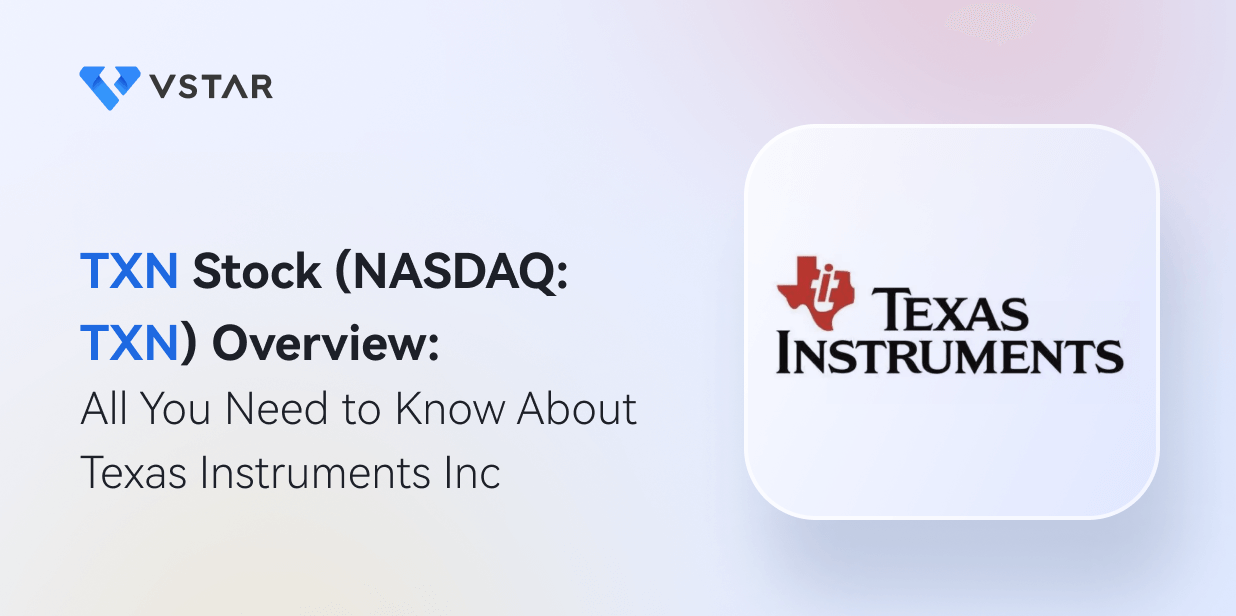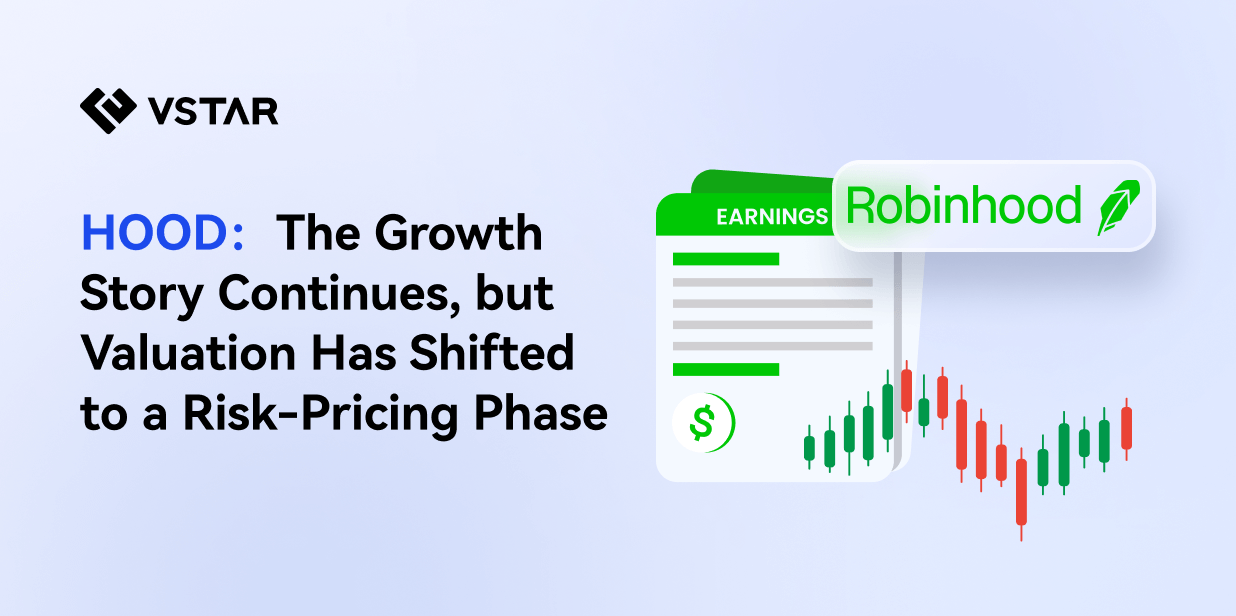Introduction
Texas Instruments Inc (NASDAQ: TXN) is a global leader in the semiconductor industry that offers various products and services for electronics, communications, computing, and industrial applications. The company has been making headlines recently with its strong earnings, dividend growth, and innovation. Some of the recent highlights are:
The company reported its second quarter 2023 financial results on July 25, 2023, beating analysts' expectations on both revenue and earnings.
- TSN Revenue: $4.53 billion, up 3% sequentially and down 13% from the same quarter a year ago.
- TSN Earnings per share: $1.87, up 4% sequentially and down 11% from the same quarter a year ago.
- The company announced its third-quarter 2023 dividend of $1.02 per share on July 20, 2023, representing a 13% increase from the previous quarter and a 24% increase from the same quarter last year.
- The company unveiled its new TI-Innovator Rover, a programmable robotic vehicle that can be used to teach students STEM concepts such as coding, math, and engineering, on August 4, 2023.
But what is Texas Instruments' business model, how does it make money, and what are the challenges and opportunities it faces? And most importantly, is TXN stock a good investment for traders?
I. Texas Instruments Inc's Overview

Source: DallasNews
Texas Instruments Inc was founded in 1930 by Cecil H. Green, J. Erik Jonsson, Eugene McDermott, and Patrick E. Haggerty as Geophysical Service Incorporated (GSI), a company that provided seismic exploration services for the oil industry. The company changed its name to Texas Instruments in 1951 and started to focus on electronics and semiconductors.
Today, Texas Instruments is the world's third-largest semiconductor company by revenue, headquartered in Dallas, Texas. The company has two main segments: Analog and Embedded Processing. The company is led by CEO Rich Templeton, who joined Texas Instruments in 1980 and became the chief executive in 2004. Some of the top shareholders of Texas Instruments are Vanguard Group, BlackRock, State Street, and Capital Group.
Texas Instruments has invented and developed many groundbreaking technologies and products that have shaped the fields of electronics, computing, communication, and engineering. Some of the notable milestones in the company's history are:
- Inventing the first commercial silicon transistor in 1954, which enabled the miniaturization and mass production of electronic devices
- Developing the first integrated circuit in 1958, which paved the way for the digital revolution and the creation of microprocessors
- Launching the first handheld calculator in 1967, which revolutionized the field of mathematics and education
- Introducing the first single-chip microcontroller in 1971, which made possible the development of embedded systems and smart devices
- Producing the first digital signal processor in 1982, which enhanced the performance and quality of audio, video, and communication signals
- Acquiring National Semiconductor for $6.5 billion in 2011, which expanded the company's portfolio and market share in the analog segment
These milestones demonstrate the company's leadership and excellence in the semiconductor industry.
II. Texas Instruments Inc's Business Model and Products/Services
Texas Instruments makes money from two main sources: selling its products and providing its services.
The products segment generates revenue from the sale of Texas Instruments's hardware and software products for electronics, communications, computing, and industrial applications. The average selling price (ASP) of Texas Instruments' products varies depending on the type and complexity of the product.
The services segment generates revenue from the fees that customers pay to access Texas Instruments' technical support, design services, cloud services, etc. The company offers various types of services, such as online support tools, reference designs, software development kits (SDKs), software-as-a-service (SaaS), etc.
The company's main products and services include:
- Analog: Chips that convert real-world signals such as sound, light, temperature, and pressure into digital signals that can be processed by computers
- Embedded Processing: Chips that perform specific functions such as controlling machines, vehicles, appliances, and devices
- Other: Products such as calculators, digital light processing (DLP) technology, sensors, microcontrollers, and power management devices.

Source: BusinessJournal
III. Texas Instruments Inc's Financials, Growth, and Valuation Metrics
Texas Instruments is a leading semiconductor company that has a strong financial position with consistent revenue growth, high profitability, and solid cash flow generation. The company reported impressive results for fiscal year 2023 (ended March), showing an increase in revenue, net income, earnings per share, gross margin, operating margin, and return on equity compared to the previous year. Here are some notable metrics:
- Texas Instruments's revenue reached $16.3 billion, up 8% year-over-year, driven by strong demand for its analog and embedded processing products across various markets.
- The company's net income rose 13% year-over-year to $5.6 billion, reflecting its operational efficiency and cost control.
- The company's earnings per share grew 15% year-over-year to $6.00, exceeding analysts' expectations.
- The company's gross margin improved by 1 percentage point year-over-year to 64%, indicating its ability to maintain high-quality products and pricing power.
- The company's operating margin increased by 2 percentage points year-over-year to 42%, demonstrating its effective management of expenses and investments.
- The company's return on equity improved by 5 percentage points year-over-year to 59%, showing its superior performance in generating profits from shareholders' equity.
- The company also strengthened its balance sheet and cash flow position, with free cash flow increasing by 10% year-over-year to $6 billion, cash and short-term investments increasing by 9% year-over-year to $7.4 billion, and total debt decreasing by 3% year-over-year to $6.2 billion.
These financial highlights indicate that Texas Instruments is a well-established and profitable company that has a competitive edge in the semiconductor industry.
One way to compare Texas Instruments' valuation to its peers is to use valuation multiples, which are ratios that measure how much investors are willing to pay for a company's earnings, sales, assets, or equity. Some of the common valuation multiples are:
The table below shows the valuation multiples of Texas Instruments and its peers as of August 2023:
|
Company |
P/E |
P/S |
P/B |
EV/EBITDA |
|
Texas Instruments |
28.8 |
11.1 |
14.7 |
20.9 |
|
Analog Devices |
40.2 |
12.4 |
5.1 |
27.4 |
|
Intel |
12.2 |
3.1 |
2.9 |
7.6 |
|
Microchip Technology |
38.9 |
7.5 |
6.8 |
22.8 |
|
Nvidia |
87.6 |
29.9 |
29.4 |
66.9 |
|
Qualcomm |
19.9 |
5.4 |
20.8 |
15 |
Source: Yahoo Finance
Based on these multiples, we can see that Texas Instruments is trading at a higher P/E, P/S, P/B, and EV/EBITDA than the average of its peers, indicating that the stock is relatively overvalued compared to its earnings, sales, assets, and operating performance. However, Texas Instruments is trading at a lower P/E, P/S, P/B, and EV/EBITDA than some of its peers, such as Analog Devices and Nvidia, indicating that the stock is relatively undervalued compared to some of its competitors.
IV. TXN Stock Performance Analysis
TXN Stock Trading Information
Texas Instruments's stock trades on Nasdaq under the ticker symbol TXN. The company went public in July 1953 at an initial price of $0.06 per share (adjusted for stock splits). Since then, TXN stock has split six times (2-for-1 in June 1964; June 1966; June 1972; June 1976; June 1987; and May 2000).
Trading hours
The regular trading hours for TXN stock on Nasdaq are from 9:30 a.m. to 4:00 p.m. Eastern Time (ET), Monday to Friday, except for market holidays.
Pre-market and after-market: Investors can also trade TXN stock in the pre-market and after-market sessions, which are from 4:00 a.m. to 9:30 a.m. ET and from 4:00 p.m. to 8:00 p.m. ET, respectively. However, these sessions may have less liquidity and higher volatility than the regular trading hours. Investors are advised to use limit orders when trading in these sessions.
TXN Dividend
Texas Instruments stock has been paying dividends to its shareholders since 1994. The company has increased its dividend for the past 19 consecutive years. The most recent quarterly dividend of $1.24 per share was paid on August 15, 2023. The annualized TXN stock dividend per share is $4.96, which gives a dividend yield of 2.95% as of September 07, 2023. The dividend payout ratio is 59.62%, based on the trailing year of earnings. The company also has a share repurchase program, which allows it to buy back its own shares and reduce the number of outstanding shares. The company announced a new $10 billion share repurchase authorization on October 20, 2023.
TXN Stock Performance
Texas Instruments stock price has reached several historical highs and lows over the years. The highest closing price was $193.66 on January 8, 2021, during the semiconductor boom. The lowest closing price was $0.17 on October 19, 1987, during the Black Monday crash. The current TXN stock price as of August 28, 2023, is $168.42, which is near its 52-week high of $193.66 and far above its 52-week low of $119.12.
Texas Instruments stock price has been volatile and trended downward in the past year, driven by several factors, such as:
- Mixed earnings results and guidance. The company missed revenue estimates and gave lower guidance for the next quarter, due to weak demand and supply chain issues.
- Slowing revenue growth and order growth. The company's revenue and order growth slowed down in the fourth quarter of fiscal year 2023, due to the impact of the pandemic on its personal electronics and automotive segments.
- Supply chain constraints and component shortages. The company faced supply chain problems and component shortages that limited its production and raised its costs.
- Decreasing demand for personal electronics and automotive products amid the pandemic. The company saw a decline in demand for its products in the personal electronics and automotive segments, which were affected by the reduced consumer spending and the lower vehicle production amid the pandemic.
- Increasing competition and price pressure from rivals such as Qualcomm, Broadcom, Nvidia, and Intel. The company faced competition and price pressure from its rivals in the analog, embedded processing, wireless, and data center markets, which reduced its margins and profitability.
These are some of the factors that drove TXN stock price volatility and downward trend in the past year.
TXN Stock Forecast
key resistance and support levels
TXN stock price faces some key resistance and support levels in the near term. Based on the technical analysis of TradingView, the current resistance levels are $170.00, $175.00, and $180.00, while the current support levels are $165.00, $164.00, and $163.00.

Source: TradingView
Based on the current technical analysis, it appears that TXN stock price is facing some resistance at the $170.00 level. If the price can break through this level, it could move up to the next resistance level at $175.00. However, if the price falls below $170.00, it could move down to the support level of $165.00.
Ultimately, the direction of Texas Instruments stock price will depend on several factors, including the overall market conditions, the company's financial performance, and investor sentiment. However, the resistance and support levels can provide traders with some insights into the potential price movements of the stock.
Analysts Recommendations for TXN stock price
Analysts have different opinions and price targets for Texas Instruments's stock. Based on the consensus of 30 analysts surveyed by TipRanks, the average price target is $176.96, which implies an upside of 5% from the current price. The highest price target is $220.00, which implies an upside of 31%, while the lowest price target is $140.00, which implies a downside of 17%. The majority of analysts (18) have a hold rating on the stock, while eight have a buy rating and four have a sell rating.
According to Stock Analysis, based on 21 stock analysts, the average 12-month stock price forecast for Texas Instruments stock is $179.05, which predicts an increase of 6%. The lowest target is $140 and the highest is $220.
According to MarketBeat, the TXN stock price forecasts range from $140.00 to $220.00. On average, they expect the company's share price to reach $177.68 in the next twelve months. This suggests a possible upside of 5% from the stock's current price.
Based on above texas instruments stock forecast, it seems that Texas Instruments' stock has a moderate potential for growth in the future, but also faces some downside risks from competition and market uncertainty. Traders should be cautious and monitor the market trends and news closely before making any investment decisions.
V. Challenges and Opportunities
Texas Instruments faces some competitive and operational risks that could affect its business performance and stock price. However, the company also has some growth opportunities and a positive future outlook that could enhance its competitive edge and market position.
Competitive Risks
Texas Instruments operates in a highly competitive and dynamic industry that is constantly evolving with new technologies, standards, customer preferences, and regulations. The company competes with various players in different segments and markets, such as:
- Qualcomm, Broadcom, Nvidia, and Intel in the wireless, data center, artificial intelligence, and automotive markets.
- Analog Devices, Maxim Integrated, Microchip Technology, and STMicroelectronics in the analog market.
- NXP Semiconductors, Renesas Electronics, Infineon Technologies, and ON Semiconductor in the embedded processing market.
Some of these competitors have lower cost structures, larger customer bases, stronger brand recognition, or more diversified product offerings than Texas Instruments. They may also offer more innovative or disruptive solutions that could challenge Texas Instruments' market leadership or reduce its profitability.
Despite the competitive risks, Texas Instruments has some competitive advantages that help it maintain its leadership position in the semiconductor industry. These advantages include:
- Strong brand recognition: Texas Instruments has been in business for over 90 years and has a reputation for providing high-quality, reliable products. The company's brand recognition is further strengthened by its focus on customer relationships.
- Broad product portfolio: Texas Instruments offers a wide range of semiconductor products, including analog, embedded processing, and digital signal processing chips. This broad product portfolio gives the company a wider reach and allows it to serve a wider range of customers.
- Manufacturing and technology leadership: Texas Instruments is a leading manufacturer of semiconductor chips. This gives Texas Instruments a cost advantage and allows it to develop new products faster than its competitors.
Other Risks
Texas Instruments also faces some other risks that could adversely affect its business operations or financial results, such as:
- Supply chain disruptions or component shortages that could limit its production capacity or increase its costs.
- Cybersecurity breaches or data privacy violations that could compromise its network infrastructure or customer data.
- Legal disputes or regulatory actions that could result in fines, penalties, injunctions, or reputational damage.
- Macroeconomic uncertainties or geopolitical tensions that could affect its global sales or operations.
- Currency fluctuations or tax changes that could impact its foreign exchange rates or effective tax rates.
Growth Opportunities

Source: Reuters
Despite these risks, Texas Instruments has some growth opportunities that could enable it to expand its market share, revenue streams, customer base, and competitive advantages. Some of these opportunities are:
- Leveraging its strong position in the analog market to capture the growing demand for high-performance analog chips in various applications such as industrial, automotive, communications equipment, and personal electronics
- Capitalizing on its diversified product portfolio and broad customer base to cross-sell and upsell its products and services across different segments and markets
- Investing in research and development and acquisitions to enhance its product innovation and differentiation capabilities
- Benefiting from the increasing adoption of 5G, IoT, cloud computing, artificial intelligence, and other emerging technologies that require more advanced and efficient semiconductor solutions
Future Outlook and Expansion
Texas Instruments has a positive future outlook and plans to expand its business in various ways. Some of these plans are:
- Increasing its focus on the industrial and automotive markets, which have higher growth potential and longer product life cycles than other markets
- Pursuing strategic partnerships and alliances with other technology leaders such as Microsoft, Amazon Web Services, Google Cloud, IBM, and Samsung to offer integrated solutions to customers
- Expanding its presence in high-growth regions such as Asia-Pacific, Europe, the Middle East, and Africa where there is a rising demand for digital transformation
- Enhancing its capital allocation strategy by investing in organic growth, returning capital to shareholders through dividends and buybacks, and maintaining a strong balance sheet
VI. Trading Strategies for TXN Stock
Traders can use different trading strategies to profit from TXN stock's price movements. Some of these strategies are:
CFD Trading: CFD trading is a form of derivative trading that allows TXN stock traders to speculate on the price changes of an underlying asset without owning it. CFD trading has several advantages, such as:
- Lower capital requirements
- Higher flexibility: Traders can trade in both rising and falling markets, as they can go long (buy) or short (sell) on CFDs.
- Wider access: Traders can trade on a variety of markets and instruments, such as stocks, indices, commodities, currencies, and cryptocurrencies.
Trend Trading: Trend trading is a form of long-term trading that involves following the direction of the dominant market trend. TXN stock trend traders aim to capture the major price movements that occur over months or years. Trend trading has some benefits, such as:
- Lower risk
- Higher reward
- More time: Trend traders do not need to monitor the market constantly and can balance their trading with their other commitments.
Breakout Trading: Breakout trading is a form of medium-term trading that involves entering a position when the price breaks out of a consolidation or resistance/support level. TXN stock breakout traders aim to capture the price momentum that occurs after a breakout. Breakout trading has some advantages, such as:
- Higher probability: Breakout traders can use chart patterns, volume analysis, and indicators to confirm the validity and direction of a breakout.
- Higher profit potential
- More opportunities: Breakout traders can trade on multiple time frames and market conditions and take advantage of market volatility and liquidity.
VII. Trade TXN Stock CFD with VSTAR
VSTAR is an online broker that offers CFD trading on various markets and instruments, including TXN stock. VSTAR has some features and benefits that make it a great choice for traders who want to trade TXN stock CFDs, such as:
- Low spreads and commissions: VSTAR offers competitive spreads and commissions on TXN stock CFDs, which means lower trading costs for traders.
- High leverage and margin: VSTAR allows traders to trade with up to 1:200 leverage on TXN stock CFDs, which means higher exposure and profit potential for traders.
- Fast execution and order types: VSTAR provides fast execution and various order types on TXN stock CFDs, which means more control and flexibility for traders.
- Advanced trading platform and tools: VSTAR offers an intuitive and user-friendly trading platform that supports web, desktop, and mobile devices. The platform also provides various tools such as charts, indicators, news, and signals that help traders analyze the market and make informed decisions.
- Secure and regulated: VSTAR is regulated by the Cyprus Securities and Exchange Commission (CySEC) and follows strict security measures to protect its clients' funds and data.


VIII. Conclusion
In conclusion, Texas Instruments emerges as a dominant force in the semiconductor industry, boasting a robust financial foundation characterized by consistent revenue growth, impressive profitability, and commendable cash flow generation. The company's trajectory is underscored by its remarkable ability to tap into innovative capacities and strategic alliances, positioning it to harness the burgeoning potential within rapidly expanding domains like 5G, IoT, cloud computing, artificial intelligence, and other emerging technologies.
Investors stand to benefit not only from these growth prospects but also from the company's commitment to shareholder value, exemplified through its generous dividends and share buyback programs. As a steadfast investment choice, Texas Instruments' stock appeals to traders seeking a dependable technology investment that blends stability, reliability, dividends, and a moderate growth outlook. However, prudent caution is advised, with an awareness of the competitive and operational risks the company contends with, necessitating vigilant monitoring of market dynamics and news updates before any investment commitments.
To navigate the fluctuating terrain of TXN stock's price movements, traders can employ diverse strategies such as CFD trading, trend tracking, and breakout maneuvers. Notably, VSTAR, a reputable online broker, offers a conduit for trading TXN stock CFDs, bolstered by low spreads and commissions, elevated leverage and margin options, swift execution, and a spectrum of order types, advanced trading tools, and platforms, all within a secure and regulated trading environment.
FAQs
1. What does TXN do?
Texas Instruments (TXN) is a global semiconductor company that makes analog and embedded processing chips used in many electronic devices.
2. Is TXN stock a buy?
TXN stock looks attractively valued given its position in growing markets like automotive and industrial. Many analysts have "buy" ratings on the stock.
3. What is the target price for Texas Instruments?
The average analyst price target for TXN is $187 per share, implying potential upside of about 19% from current levels.
4. How many times has TXN stock split?
Texas Instruments has split its stock 6 times in its history.


















